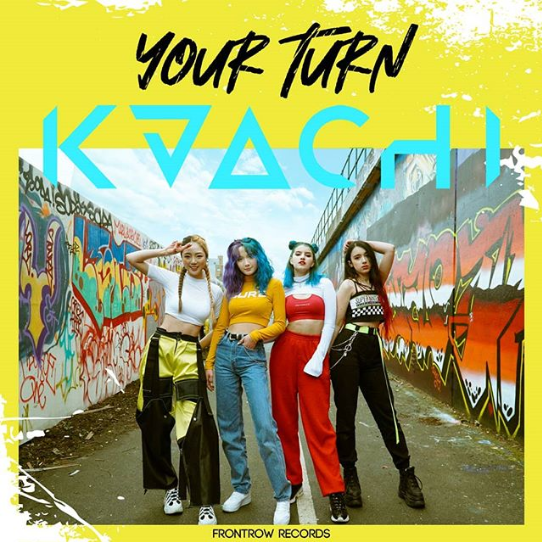
Kaachi, who recently debuted with their single “Your Turn,” is turning heads, with mixed reactions. They are the first self-proclaimed European K-pop idol group, and they did not train in South Korea. While there continue to be an increasing number of foreign idols who are debuting and gaining popularity in the South Korean music industry, they are often from an English-speaking country, China, Japan, or Thailand, and exhibit ethnic ties to Asia. Some popular examples would be Jackson Wang of Got7, Lisa of BlackPink, Momo from Twice, and Jae from Day6 who are from Hong Kong, Thailand, Japan, and America respectively. While they are often still pointed out as foreigners in the industry, for many this is not a hinderance as long as they respect societal norms and improve their Korean fluency (if they were not fluent already). Kaachi, on the other hand, have been swept up in rumors and controversy regarding their validity as an idol group. This raises the question: what does a foreigner have to do to still be considered authentic in K-pop?
Kaachi debuted on April 15th 2020 with the single “Your Turn.” The group is comprised of four members of Korean, Spanish, and British nationalities: Nicole, Chunseo, Dani, and Coco. Dani, the main rapper, is British, Nicole and Chunseo are Spanish, and Coco is Korean. Little else is known about their backgrounds besides some foods they like, their nationalities, and how they came to FrontRow, their sponsored company. These facts can be found on their YouTube channel and official group SNS accounts.
Even before their official debut, Kaachi was swept up in rumors that connected them to Ollie London (polarizing for his saesang-esque love of BTS’s Jimin), a (now deleted) video of them dissing BlackPink Jennie’s dancing, and even a rumor of the members shipping themselves with BTS’s Jungkook. In addition to an onslaught of rumors, the members have been inundated with hate comments and even death threats, prompting their company to disable YouTube commenting, threaten legal retaliation, and release a responsive video with the producer addressing said rumors.
In the videos that Kaachi have posted on their YouTube channel, it is clear that the Spanish members and British member do not speak Korean. Dani, the main rapper, is the most fluent. She can speak some simple sentences and is primarily self-taught. All of the non-Korean members are taking Korean language classes, but likely would not be able to appear on any Korean programmes without Coco translating or heavy use of a designated translator. Honestly, one should applaud their effort in attempting to learn Korean, but even foreign idols and trainees can often at least speak at a conversational level by debut. Their debut single does contain a small number of Korean lyrics, but the pronunciation is often lacking, especially juxtaposed with Coco’s unstable English vocals.
Another rumor that the producer addressed is the group’s training period. Monica, the group’s producer, does not specify how long they trained with the company, but does state that a prerequisite requirement was a minimum of five years in a performance area, whether that be vocal, rap, or dance. All four have a background in dance, with some of them not beginning any vocal training until they joined Kaachi. Nicole, Dani, and Chunseo are members of UJJN, a K-pop cover dance group based in London, while Coco has a background in Korean traditional dance, contemporary, and ballet.
Upon entering the company who represents Kaachi, FrontRow, the members all also underwent vocal and “attitude,” according to their producer. While experience is obviously necessary, it is important to evaluate the role that the trainee system plays in not only molding artists, but building group cohesion as well. The intense hours of training, rehearsals, and lessons within a company allow individuals to grow together and reinforce synchronicity, both in performance and sociability. Their experience dancing with UJJN showcases that they are not unskilled dancers, but it is worth considering if this previous experience can be a substitute for the established trainee system. The blasé response to the dancing in their music video makes me believe that it might not be.
While the members and team behind Kaachi have made it a point to advertise what Korean foods and musicians they like, they seem to be capitalizing on selective Korean culture. It is impossible to determine if the members truly enjoy these parts of Korean culture (Chunseo fangirls over tteokbokki) or if the staff have made an attempt to market them as more authentic through these Korean elements. However, they sound like they are perpetuating Korean stereotypes. While it is true that many themes in K-pop are universal (love, fantasy, etc.) there are also many aspects that remain remarkably Korean. This could be conservative views around sex, the lack of queer subject matter in the mainstream, or even deliberately addressing difficult social topics, for instance G-Dragon’s infamous diss track of the MAMA awards or Seo Taiji and Boys’ social critique despite censorship concerns. An example would be Seo Taiji and Boys’ “Come Back Home,” which comments on societal pressures of youth that compel them to “run away from home.”
There have been similar groups such as SB19, Z-Boys and Z-Girls, as well as various solo artists that have attempted this multinational model, but often with mixed results. For Z-Boys and Z-Girls (both under Zenith Media Contents), trainees continue to study and hone their Korean fluency, they are supported by a Korean based company, and they train in South Korea. They have tried to pioneer the term Z-pop to describe their multinational representation, but do not label themselves as K-pop. They also promote and perform in South Korea. SB19 by comparison is the first Filipino group trained under a South Korean entertainment company, they speak Tagalog, and they do not label themselves as K-pop but the first P-pop group.
These groups have been controversial for their deviance from traditional K-pop expectations, but have retained active fanbases and promotions for now, likely due to their adherence to at least parts of what the industry and consumers consider authentic: language, training, and content. Kaachi, on the other hand, has attempted to rewrite their own rules to appeal to a more Western-centric audience.

While these deviances from common practice in the Korean entertainment industry are subject for a reevaluation of what constitutes as K-pop, all of Kaachi’s content is likely not entirely their choosing. Although they did sign on to take on debuting for a Western-centric audience with minimal training, the way they are advertised and their music are likely the decisions of FrontRow and their staff, much like the company of any other idol group. The hate they have received is extreme and largely based off seemingly false rumors.
Is Kaachi problematic? Perhaps. Are they authentically K-pop? Not in the generally understood sense. However, with some relabeling and more extensive training and time in the industry, it is likely they could rewrite their controversial debut. It is too soon to see the fate of a project such as this, but I hope going forward, they take time to reevaluate why they consider themselves K-pop, and why they should not have to endure the same rigorous, competitive trainee system that other idols are subjected to.
(Instagram, “Interpretation of Hybrid K-Pop: The Global-Local Paradigm of English Mixing in Lyrics” by Jin and Ryoo (2012), Korea JoongAng Daily, Vice, YouTube [1][2]. Images via FrontRow.)


